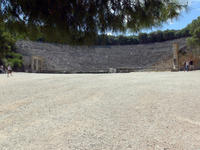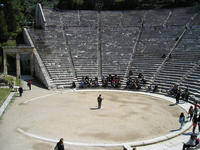You are in: Europe -> Greece -> Archaeological Site ... , and traditional search or Image Gallery will yield results of this site only
Archaeological Site of Epidaurus
| Site number: | 491 |
|
| Type of site: | Cultural | |
| Date: | 6-4th centuryBC | |
| Date of Inscription: | 1988 | |
| Location: | Europe, Greece, Region of the Peloponnesos, Prefecture of Argolis | |
Up to 75 images are shown here. Click on each for more details or on Image Gallery for more images.
| Description: | The site of Epidaurus, in its small valley within the Peloponnesus, sprawls out over several levels. Whilst the 6th century B.C. was the birth period of the cult of Asclepius, the site’s key monuments date from the 4th century, among which is the theatre – deemed one of the purest Greek architectural masterpieces. A tribute to the healing cults of Greek and Roman times, the immense site holds temples and hospital buildings devoted to its gods. --WHMNet paraphrase from the description at WHC Site, where additional information is available. | |
| Epidaurus (Greek: Ἐπίδαυρος, Epidauros) was a small city (polis) in ancient Greece, at the Saronic Gulf. The modern town Epidavros (Επίδαυρος), part of the prefecture of Argolis, was built near the ancient site. Epidaurus was independent of Argos and not included in Argolis until the time of the Romans. With its supporting territory, it formed the small territory called Epidauria. Reputed to be the birthplace of Apollo's son Asklepios, the healer, Epidaurus was known for his sanctuary situated about five miles (8 km) from the town, as well as its theater, which is once again in use today. The cult of Asklepios at Epidaurus is attested in the 6th century BC, when the older hill-top sanctuary of Apollo Maleatas was no longer spacious enough. --Wikipedia. Text is available under the Creative Commons Attribution-ShareAlike License. | ||
| Source: | http://whc.unesco.org/en/list/491 | |
| Reference: | 1. UNESCO World Heritage Center, Site Page. | |


























